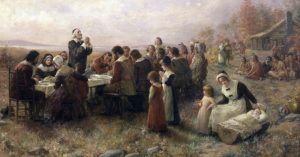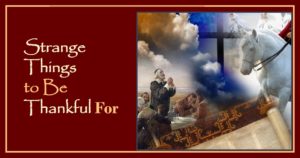Strange Things to Be Thankful For
These things may not make you popular if you list them as blessings around the dinner table.
But Jesus did!
I spent some time a couple years ago researching the story of Plymouth Colony for an EBook. (The Meaning’s Not Just the Menorah: TWO Holiday Stories Every Believer Should Know. You can grab it here if you’d like. 😊 ) And I have to say, I was blown away. I think anyone who grew up in the U.S. knows the fundamentals of the story. But reading about it in their own words… I was awed and inspired.
What kind of faith bears believers across oceans and sustains them through the valley of the shadow of death?
How could people who gave up everything to obey God’s word as they understood it—only to face weeks of illness, the loss of wives, husbands, children—not start to question at least a little?
“God, are You really in this thing? Heavenly Father, are You there?”
I’m sure I would! But the Pilgrims’ accounts give no hint of this. Instead, they
- Accept God’s sovereign will when they experience it as adversity;
- Thank Him when they experience it as blessing; and
- Approach Him with an attitude of trust at all times.
For example, listen to what Bradford wrote about their first winter:
But it pleased God to visit us then with death daily, and with a disease so disastrous that the living were scarcely able to bury the dead, and the healthy not in any measure to tend the sick.
But he also testifies:
…they had borne their sad afflictions with as much patience and contentedness as I think any people could do. But it was the Lord who upheld them, and had beforehand prepared them…
Wow.

Detail from “The First Thanksgiving at Plymouth” (1914) by Jennie A. Brownscombe, courtesy of Wikimedia Commons. Not sure how the Plains Indians shown at the head of the table got to Massachusetts! But the attitude of sincere thankfulness to God is beautifully depicted.
(There’s more about their story in the EBook, if you’re interested. 🙂 )
When We Call Ourselves Blessed…
When I think about my blessings, I tend to start with some crucial but predictable things.
- Salvation through Jesus.
- A right relationship with God. (Yeah, I know, that’s the same thing but it bears repeating. 😊 )
- My family—the one I was raised in; the more extended family I’m blessed to be part of now.
- Good health.
- A nice home.
…and so on. All wonderful blessings the Lord absolutely deserves my thanks and praise for.
…Versus When the Bible Calls Us Blessed
But I’m challenged by this other thing the Bible says.
Consider it all joy, my brethren, when you encounter various trials, knowing that the testing of your faith produces endurance. And let endurance have its perfect result, so that you may be perfect and complete, lacking in nothing. (James 1:2-4)
Is that perhaps what Bradford meant by, “it was the Lord who upheld them, and had beforehand prepared them…”? The persecution the Puritans experienced in King James’ England—prison, fines, even execution—equipped them to bear up under the trials they encountered in New England.
Beloved, do not be surprised at the fiery ordeal among you, which comes upon you for your testing, as though some strange thing were happening to you; but to the degree that you share the sufferings of Christ, keep on rejoicing, so that also at the revelation of His glory you may rejoice with exultation. If you are reviled for the name of Christ, you are blessed, because the Spirit of glory and of God rests on you. Make sure that none of you suffers as a murderer, or thief, or evildoer, or a troublesome meddler; but if anyone suffers as a Christian, he is not to be ashamed, but is to glorify God in this name. (1 Pet 4:12-16)
Rejoice? Blessed? Glorify God? With exultation? When’s the last time I sat at the Thanksgiving table and thanked the Lord for my trials?
What is highly esteemed among the world is of little value to God, and conversely, what is of value to God is often scoffed at by the world. “For the foolishness of God is wiser than men, and the weakness of God is stronger than men” (1 Cor 1:25).
– John J. Parsons, Hebrew4Christians.com
It’s especially poignant to think about this in these days, when Christians around the world are indeed undergoing a “fiery ordeal.” As this year’s video for the International Day of Prayer states,
“Too many to count, too many unknown. All because they bear the name of Jesus.”
Still, the statistics we have tell a heartwrenching story. Here are a few from Open Doors’ World Watch List 2019:
- 1 in 9 Christians worldwide experience high levels of persecution.
- On average, 11 Christians are killed every day for their faith.
- And that doesn’t count those who are detained without trial, sentenced and imprisoned.
- At least six women every day are raped, sexually harassed or forced into marriage to a Muslim man under the threat of death for their Christian faith.
- More than a thousand churches or Christian buildings were attacked last year.
- Christianity now faces the possibility of being wiped out in parts of the Middle East where its roots go back furthest.
And tragically, the Western media (and church) are largely silent about the genocide! 🙁 🙁
Yesterday, I read an article from International Christian Concern that gave me a new perspective on thankfulness. It was the story of an Ethiopian woman whose husband was martyred for ministering the gospel. She went through a period of deep mourning and doubting God’s goodness–until ICC showed up with a gift in direct answer to her prayers. They brought three cows, which would enable her to support herself and the couple’s newborn daughter. Reading how she wept with thankfulness to learn that Western Christians cared about her trials made me wonder how I can do more.
The New Testament is filled with encouragement and consolation for Christians experiencing persecution. And even for those who are not, in Matthew 5 Yeshua gives us a long list of things we can be happy about. And it’s pretty counterintuitive.
Blessed are the poor in spirit, for theirs is the kingdom of heaven.
Blessed are those who mourn, for they shall be comforted.
Blessed are the gentle, for they shall inherit the earth.
Blessed are those who hunger and thirst for righteousness, for they shall be satisfied.
Blessed are the merciful, for they shall receive mercy.
Blessed are the pure in heart, for they shall see God.
Blessed are the peacemakers, for they shall be called sons of God.
Blessed are those who have been persecuted for the sake of righteousness, for theirs is the kingdom of heaven.
Blessed are you when people insult you and persecute you, and falsely say all kinds of evil against you because of Me. Rejoice and be glad, for your reward in heaven is great; for in the same way they persecuted the prophets who were before you. (Matt 5:3-12)
The initial phrase of each of the Beatitudes does not contain a verb. There is no “are,” no “is,” no “blessed are.” Instead of reading them as statements, then, (e.g., “blessed are the poor in spirit”) they should be read as exclamations: “O the blessedness of the poor in spirit!” This way of reading agrees with the Hebrew use of ashrei, an interjection that means “how happy!” (from the root that means to walk righteously in joy) that is often used in the Psalms. Each initial phrase therefore does not function as a conditional statement, but rather expresses a present reality: “O the joy of the poor in spirit, of the mourners, of… those who are persecuted….”
– John J. Parsons, Hebrew4Christians.com

Hillside above the Sea of Galilee. Yeshua probably gave the Sermon on the Mount somewhere near this spot.
It’s almost hard to wrap your head around how counterintuitive / counter-culture Yeshua’s list is.
There’s a wonderful meditation on this passage on Hebrew4Christians.com. I’ll cherry-pick a few points that hit home for me.
Blessed are the poor in spirit. The term translated “the poor” is derived from a word that means to crouch as a helpless beggar…. You are made rich indeed when you encounter your spiritual bankruptcy, brokenness, and must entirely depend on God for your daily miracle…. The opposite of poverty of spirit is human pride that leads to misery: “O the misery of the proud in spirit, for theirs is the Kingdom of Self.”
Blessed are those who mourn. This is a paradoxical statement, since those who genuinely mourn are anything but happy…. Indeed, according to the world, such a statement seems illogical and perhaps incoherent…. As Socrates once said, “The unexamined life is not worth living,” (Apology) but the world system does not examine and therefore grieve over the sinful condition of humanity…. Those who mourn care deeply. Such sorrow expresses the longing to be released from the inner sickness of evil…. How shall God be able in heaven to dry up your tears when you have not yet wept?…
The opposite of godly sorrow and teshuvah (Biblical repentance—turning from sin) is profane happiness: “O the misery of those who love this world, for they will receive no consolation in the world to come.”
Blessed are the gentle. The opposite of “meekness” is self-assertiveness, manipulation, deception, and violent aggressiveness: “O the misery of those who demand their ‘rights’ in this world, for they will receive no inheritance in the world to come.”
Blessed are the merciful. The pagan Roman world despised pity… The Pharisees related suffering to sin (see Matthew 23:23). Indeed the idea of “karma”–suffering as a necessary evil and immutable consequence for sin (either in this life or a previous one)—is an age-old belief. In contrast to these widespread ideas of the day, Jesus instructs that we should show sympathy and love and kindness to those who are afflicted.
Blessed are the pure in heart. “Purity of heart” is of great value, since it implies, as Kierkegaard noted, “to will one thing.” We simply cannot see God if we are duplicitous or wavering in our passion for his presence and truth.
Blessed are those who have been persecuted. It is a frightening thought to consider that our faith is so tepid that the wicked do not persecute but simply ignore us. …. Persecution for the sake of Jesus and righteousness is cause for celebration…
– John J. Parsons, Hebrew4Christians.com
I think Yeshua’s list would make for pretty interesting dinner conversation with the relatives! (Although I’m not sure I’m going to try it.)

William Bradford’s 1592 Geneva Bible. It traveled with him from England to Holland to Massachusetts. The Puritans preferred the “unauthorized” Geneva Bible, believing it more accurate than the version authorized by King James.
Another Strange Thing I’m Thankful For
Here’s another thought that could make the extended family dinner table lively. I used to wish I could have been alive when Jesus walked the earth. How amazing would it have been to see “the Word made flesh”? But I’ve come to realize that the days in which we live are just as prophetically significant. I know each one of us is here now because God has some special work for us.
What a privilege to be placed here now, “for such a time as this” (Est 4:14). I’m very thankful for that. I pray regularly that I won’t miss a single nuance of the good works God has prepared beforehand for me (Eph 2:10)–and I pray that for you too.
I also think about this. The prophet Joel received a word that a horrible judgment was coming. His prophecy starts by crying out a warning to “all the inhabitants of the land” (Joel 1:2). But he moves on pretty quickly to focus on the priests. He charges them with waking the people to their danger.
Blow a trumpet in Zion,
Consecrate a fast, proclaim a solemn assembly,
Gather the people, sanctify the congregation,
Assemble the elders,
Gather the children and the nursing infants.
Let the bridegroom come out of his room
And the bride out of her bridal chamber.
Let the priests, the Lord’s ministers,
Weep between the porch and the altar,
And let them say, “Spare Your people, O Lord,
And do not make Your inheritance a reproach,
A byword among the nations.
Why should they among the peoples say,
‘Where is their God?’” (Joel 2:15-17)
Joel’s prophecy is widely referenced in the New Testament as a picture of the coming tribulation (Matt 24:29, Luke 21:25, Acts 2:20 referencing Joel 2:30-32). But who are the priests in our day God has entrusted with this awesome responsibility of repenting, interceding and alerting the people?
But you are a chosen race, a royal priesthood, a holy nation, a people for God’s own possession…. (1 Pet 2:9-10)
Umm… Brothers and sisters, that would be you and me!
I’m so thankful I was born “for such a time as this,” along with each of you! Let’s be about our Father’s business at this crucial time in history!
If you’ve never opened God’s free gift of salvation through Jesus (Rom 3:23, 6:23), please please please be persuaded to do it now! It’s simple. Just tell God from your heart that you admit you’re a sinner that needs a Savior (“For all have sinned and fall short of the glory of God.” Rom 3:23) that you’re done running your own life, and that you’re ready to make Jesus Lord of your life.
If you confess with your mouth Jesus as Lord, and believe in your heart that God has raised Him from the dead, you shall be saved. For with the heart a person believes, resulting in righteousness, and with the mouth he confesses, resulting in salvation. For the Scripture says, “Whoever believes in Him will not be disappointed.” (Rom 10:9-11)
The decision that saves you is that simple!
Simple… But no one said living it out will be easy. Especially now, in these last days.


Well done.